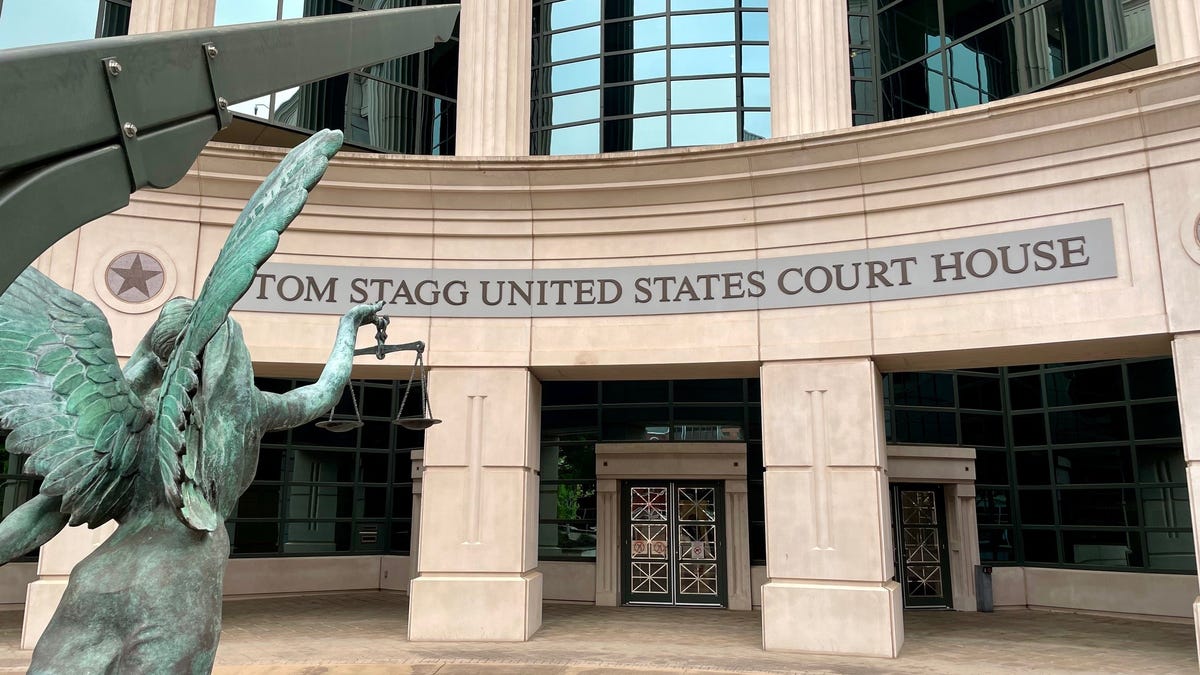Wisconsin
Wisconsin Watch: Wisconsin voters with disabilities demand a better way to vote absentee

A new lawsuit seeks an electronic voting option so voters have a right to cast an absentee ballot privately and unassisted, but there are security risk concerns.
This article is republished from Wisconsin Watch.
When Stacy Ellingen, a 38-year-old Oshkosh resident with athetoid cerebral palsy, wants to cast a ballot, she relies on voting absentee because she can’t drive, and caregiver transportation to the polls is unreliable.
But even voting from her home is a struggle—and the process may well mean sacrificing her constitutional right to a secret ballot.
Unlike more than a dozen other states providing fully electronic absentee voting for people with disabilities, Wisconsin requires absentee voters to cast their votes on a paper ballot. Ellingen, a university graduate and small business owner, lacks the fine motor skills to fill out a paper ballot herself.
She’s welcome to use help under current law, but Ellingen said she prefers not to have her caregivers assist because she usually feels uncomfortable sharing her political preferences with them. At times, she has turned to her parents, who live an hour away, for help filling out ballots, but they’re not always around.
Those obstacles have kept Ellingen from voting in some elections, she told Votebeat on Friday in a statement typed using an enlarged keyboard and an eye-gaze system. And she knows her obstacles under current law may only increase.
“Each election, a question always comes to mind: What’s going to happen when my parents are no longer here?” she said. “Will I be able to vote? I honestly don’t know. It’s a disheartening, but very real thought. Having to rely on my mom or dad for something I could easily do independently if given the appropriate accommodation is extremely frustrating!”
Ellingen is among four voters with disabilities who, along with Disability Rights Wisconsin and the League of Women Voters of Wisconsin, sued the Wisconsin Elections Commission on Tuesday to allow them to receive and return absentee ballots electronically, just as military and overseas voters in many other states do.
The lawsuit alleges that the state’s election system places undue burdens on the right to vote for Wisconsinites with disabilities. It also alleges that the state’s failure to provide accommodations within its absentee ballot system violates the Americans with Disabilities Act’s guarantees that people with disabilities have an equal opportunity to benefit from government services.
Wisconsin Elections Commission spokesperson Riley Vetterkind declined to comment for this story.
The issue isn’t unique to Wisconsin. Nationwide, 1 in 7 voters with disabilities faced difficulties voting in 2022, compared with 1 in 9 in 2020, according to a Rutgers University and SSRS analysis. Americans with vision and cognitive disabilities were likeliest to face difficulties voting, the analysis found. And Americans with disabilities were far likelier than nondisabled Americans to run into difficulties voting, whether absentee or at the ballot box.
Push for accessible voting grew during the pandemic
The Wisconsin case is similar to several successful lawsuits filed across the country. Many of those cases came amid the COVID-19 pandemic, which raised hurdles for voters with disabilities, because many of them couldn’t or didn’t feel safe voting in person, and voting absentee required them to complete ballots they couldn’t fill out alone. According to the lawsuits, that eliminated their right to a secret ballot, something every state either guarantees in its constitution or references in state law.
“A lot of us who have mobility and the transportation and so forth could go to the polls if we didn’t like the way that absentee ballots were handled, but during the pandemic it became mission critical to have, in more jurisdictions … a way for us to mark ballots independently,” National Federation of the Blind spokesperson Chris Danielsen said.
At this point, 13 states allow voters with disabilities to electronically fill out and return absentee ballots, according to the National Federation of the Blind. Others, like Vermont, Michigan, Maryland, and Pennsylvania, allow voters with disabilities to fill out ballots electronically, though depending on the jurisdiction they have to print and return them by mail, drop box, or in person.
Ellingen said the problem in Wisconsin was especially infuriating given that accessible technology exists elsewhere.
“For the life of me, I don’t understand why this isn’t an option for everyone, but it should be at least available as an accommodation for those who are unable to cast a ballot independently,” she said.
Voters with disabilities, especially those who are blind or have low vision, have for years lobbied for more accessible absentee voting. But they have often faced pushback over the security of receiving, casting, and returning ballots electronically. Governmental election security experts say that sending digital copies of ballots to voters is safe, and that filling them out electronically is somewhat safe, but that returning them electronically adds significant security risks.
Still, filling and returning absentee ballots electronically is the gold standard for many people with disabilities, including blind and low-vision voters, Danielsen said. Allowing voters with disabilities to fill out a ballot electronically and return it by mail is a step in the right direction, but it’s inconvenient for people without printers, he said.
Lawsuit alleges “incomplete framework” for protecting right to vote
The Wisconsin lawsuit acknowledges that federal and state laws provide some accommodations for voters with disabilities, but they “focus on assistance to the detriment of independence,” which “forces voters to give up their constitutional right to a secret ballot.”
State law previously allowed clerks to send absentee ballots over email and fax to any eligible Wisconsin voter. In theory, the measure allowed voters with disabilities to mark ballots electronically using a screen reader, a 2023 report by the Wisconsin Elections Commission stated.
But Denise Jess, executive director of the Wisconsin Council of the Blind & Visually Impaired, said she never knew about or used the method. Don Natzke, a plaintiff in the lawsuit who’s blind, said the same.
“When you end up having a policy or opportunity out there that isn’t made available to people or knowledge brought to their attention, it sort of rings hollow,” Natzke said.
In any case, that option was taken away in 2011, when then-Gov. Scott Walker signed a bipartisan bill restricting electronic absentee voting only to military and overseas voters. A federal appeals court upheld the law in 2020, eliminating the ability for voters with disabilities to independently fill out an absentee ballot, the Wisconsin Elections Commission report stated.
“Voters with blindness or low vision still do not have an accessible absentee ballot or certificate
envelope that can be marked independently,” that WEC report stated.
Natzke said he witnessed firsthand the lack of accessibility for people with disabilities.
Natzke, a Shorewood resident who has been blind since he was 12, said he has tried to vote in person in every election since the 1970s, but the COVID-19 disrupted that routine. Dealing with high blood pressure and concerned that his age made him more vulnerable to the virus, he instead opted for an absentee ballot in 2020.
Using a paper ballot in that spring election, Natzke held a phone in one hand to scan the text while trying to figure out with a remote helper where he should mark the ballot. He couldn’t ask his wife to guide him, because she is also blind.
The process, he told Votebeat, “became absolutely infeasible, and it wasn’t something that could possibly work out, so I abandoned it. And then because of the restrictions, not wanting to be exposed to the virus, I didn’t actually end up being able to vote for that election.”
Even if he had somebody to assist him in person with voting, it would have presented a COVID-19 health risk and compromised the privacy of his vote, he said.
The lawsuit asks the Dane County Circuit Court to allow voters with disabilities to electronically receive, mark, and return absentee ballots. A federal appeals court in 2020 upheld the law restricting who can receive ballots electronically, but the case wasn’t brought by Wisconsinites with disabilities and didn’t contain the same claims as the lawsuit filed on Tuesday, the complaint states.
The plaintiffs aren’t asking the court “to develop and engineer a revolutionary method of accessible absentee voting,” the complaint states. “Enfranchising Wisconsin’s print disabled voters … is simply a question of implementing existing solutions.”
Thirty-one states, along with the District of Columbia and the U.S. Virgin Islands, allow military and overseas voters to receive, cast, and return ballots electronically, according to the National Conference of State Legislatures. At least a dozen of those states extend the same voting method to people with disabilities.
Lawmakers raise concerns over security of electronic absentee voting
Jess, who called the inability to vote absentee in an accessible way a “compromise of basic human dignity,” said she received pushback when she urged Wisconsin lawmakers to allow for electronic voting.
Specifically, she said, the lawmakers raised fears that transmitting and returning ballots digitally could allow somebody to tamper with them.
Jess mentioned to lawmakers the less risky option of receiving and casting ballots electronically and then printing and returning the physical ballot, but she said, “there’s not even an openness to that.”
The Legislature’s two election committee chairs, Rep. Scott Krug, R-Nekoosa, and Sen. Dan Knodl, R-Germantown, didn’t respond to a request for comment.
Federal agencies have also raised concerns over the security of electronically delivering, marking and, especially, returning ballots.
There are “effective risk management controls” to enable electronic ballot delivery and casting, but returning ballots electronically is “high-risk even with controls in place,” states a report by several federal agencies, including the Cybersecurity and Infrastructure Security Agency and the Election Assistance Commission.
The risks of returning ballots electronically can affect an election’s results and occur at scale, the report found. It further stated that securing ballot return digitally while guaranteeing voter privacy and ballot integrity is “difficult, if not impossible, at this time.”
But if election officials choose or are mandated to allow electronic ballot returns, they should allow voters returning ballots electronically to check their ballots’ status, the agencies stated. They recommended that its use be limited to voters who can’t vote any other way.
Voters with disabilities fit the category of people who have no other means to return their ballots privately and independently, said Eileen Newcomer, voter education manager at the League of Women Voters of Wisconsin. While there may be security risks, Newcomer said the risk of voters’ being disenfranchised must also be addressed.
Despite warnings about the risks of electronic voting, there have been no instances of widespread electronic voter fraud or high-profile prosecutions of people alleged to have tampered with the electronic system that voters with disabilities use.
Voters with disabilities would have to understand the risks of returning ballots electronically if the lawsuit is successful, Disability Rights Wisconsin public policy manager Lisa Hassenstab said. But she said the organization didn’t want to budge on its request for electronic ballot return, because the alternative — printing and returning physical ballots — could sacrifice voters’ ability to vote privately and independently.
She also said current fears about security risks will soon be overcome by better technology.
Between August 2021 and September 2022, the University of California, Berkeley, hosted a working group of election, technology, and cybersecurity experts to discuss the feasibility of creating standards to enable safe and secure electronic marking and return technologies.
The group found that widespread adoption of electronic return requires technologies that don’t currently exist or haven’t been tested.
The group pointed out six particular concerns that could threaten election security: client-side malware; the potential for people to hack voters’ computers; a targeted denial-of-service attack; the difficulty in verifying voters’ identities; the absence of a physical ballot that voters can verify; and the possibility that a small group of people could alter votes in bulk.
While the group cautioned against electronic return technology, it said eliminating that path for voting without reasonable alternatives could “produce an unacceptable risk to those with accessibility needs and would place election officials” at risk of violating federal laws like the Help America Vote Act and the ADA, the group stated. The group advocated for the research and development of technologies to improve accessibility.
Natzke said electronic voting would remove a barrier for voters with disabilities just as curb cuts in raised sidewalks made streets more accessible. “We need to have that curb cut because we know it can work,” he said
“To not do that, when you know that it’s there, makes a statement, because it’s been done elsewhere,” he said. “So when there’s a choice to then not do it, it ends up really concerning me in terms of the position people with disabilities hold in the hands of our policymakers.”
This coverage is made possible through Votebeat, a nonpartisan news organization covering local election administration and voting access. Sign up for Votebeat’s free newsletters here.
This story was produced as part of the NEW (Northeast Wisconsin) News Lab, a consortium of six news outlets.

Wisconsin
US teacher arrested for 'making out' with 5th-grader months before wedding

A 24-year-old teacher in the US has been charged with sexual assault for allegedly “making out” and having an “inappropriate relationship” with one of her fifth grade students. Madison Bergmann’s alleged abuse of the 11-year-old boy came to light less than three months before her wedding, CBS News Minnesota reported.
The incident came out in the open when the boy’s mother overheard him talking to Bergmann on the phone, and took the device away from him. The boy’s parents allegedly found texts between him and the teacher, following which they went to the school with printouts of the conversations.
According to the charging documents presented to the police, the texts included messages from Bergmann allegedly discussing several encounters with the 11-year-old inside the classroom during lunch or after school. She is also accused of telling the boy how much she enjoyed him touching her.
The boy told investigators that he talked to Madison Bergmann “almost daily” and got her number when he went skiing with her and his mother in the Afton Alps over the winter break. The teacher agreed to get his number during the trip, saying it was shared with her if they were separated at the park.
The month Bergmann went on the skiing trip was the same when he got engaged to her boyfriend.
Inside Bergmann’s backpack, a folder with the boy’s name on it was found that contained many handwritten notes. The 11-year-old told police that he and Bergmann would write each other notes throughout the day, and most of these mention the two “kissing each other”, according to court documents.
In one of the letters, Madison Bergmann allegedly questioned her relationship with the fifth-grader. “One of my cousins is in the 5th grade and I can’t imagine a man talking to her how we talk. I know we have a special relationship and I do love you more than anyone in the world, but I have to be the adult here and stop.”
Bergmann was set to be married in July, less than three months before her arrest.
She was let out on a $25,000 (nearly Rs 21 lakh) signature bond and has been placed on administrative leave. She has also been barred from school property or at school events, and from contacting any district students, parents or staff, New York Post reported.
The school principal expressed “shock” over the incident, saying they are all “disturbed by this news”. “Our greatest concern is for the River Crest School community and the children impacted,” CBS Minnesota reported, quoting Principal Kimberly Osterhues’s message to parents.
Madison Bergmann’s next court appearance is scheduled for May 30.
Wisconsin
Wisconsin Supreme Court will decide whether mobile voting sites are legal

MADISON, Wis. — The state Supreme Court announced Friday that it will decide whether mobile voting sites are legal without allowing any lower appellate courts to rule first.
The Wisconsin Institute for Law and Liberty, a conservative law firm, sued in December 2022 on behalf of Racine County Republican Party Chair Ken Brown, alleging Racine city officials illegally used a voting van to collect absentee ballots that year. A circuit judge ruled in January that state law doesn’t allow mobile voting sites to operate.
Racine City Clerk Tara McMenamin and the Democratic National Committee asked the state Supreme Court in February to review the case without letting any lower appellate courts rule on it first.
Justice Janet Protasiewicz’s election win in 2023 gave liberals a 4-3 majority on the court, increasing the likelihood of a reversal. Brown filed a motion in March asking Protasiewicz to recuse herself from the case but she declined.
The justices issued an order Friday afternoon indicating they had voted 4-3 to take the case. All three conservative justices dissented. Chief Justice Annette Ziegler, a member of the conservative block, wrote that the case hasn’t been fully briefed and the liberal justices are trying to help Democrats make political gains ahead of the November elections.
Wisconsin
Anglers get ready to hit Wisconsin’s lakes for fishing opener

SIREN, Wis. — Anglers will head to Wisconsin this weekend for the state’s fishing opener, where they’ll get a good idea of how the mild winter will also impact the fish bite during next week’s opener in Minnesota.
It’s a beautiful, picturesque Friday on Clam Lake near Siren, where all the talk is about the weather and the fishing opener.
Big Mike’s Outdoor Sports Shop in Siren has been selling bait for more than 30 years. While the Wisconsin Department of Natural Resources says fishing license sales are a little bit down after they peaked during the COVID-19 pandemic, Big Mike’s Greg Dahlke says they aren’t really seeing that.
He says a lot of anglers are eager to see how the lack of ice this past winter impacts what they catch on Saturday.
“It will pick up tremendously this afternoon. We’ve been waiting a long time. The last two winters these guys missed a lot of ice fishing. You’re probably aware, the no ice, ice, then no ice,” Dahlke said. “People are excited.”
Dahlke says water temperatures should be ideal for fish like northern and bass.
Since Big Mike’s didn’t sell as much bait this past winter due to the ice issues, Dahlke says they’re hoping to make up for lost ground this weekend.
-

 News1 week ago
News1 week agoLarry Webb’s deathbed confession solves 2000 cold case murder of Susan and Natasha Carter, 10, whose remains were found hours after he died
-

 News1 week ago
News1 week agoFirst cargo ship passes through new channel since Baltimore bridge collapse
-

 World1 week ago
World1 week agoHaiti Prime Minister Ariel Henry resigns, transitional council takes power
-

 World1 week ago
World1 week agoSpanish PM Pedro Sanchez suspends public duties to 'reflect'
-

 World1 week ago
World1 week agoUS secretly sent long-range ATACMS weapons to Ukraine
-

 Movie Reviews1 week ago
Movie Reviews1 week agoHumane (2024) – Movie Review
-

 News1 week ago
News1 week agoAmerican Airlines passenger alleges discrimination over use of first-class restroom
-

 Education1 week ago
Education1 week agoVideo: Johnson Condemns Pro-Palestinian Protests at Columbia University



















